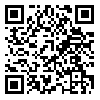مجله رویش روانشناسی از دادن گواهیهای کاغذی معذور است. لطفا تقاضا نکنید. همه گواهی ها در صفحه شخصی کاربران موجود است.
year 8, Issue 4 (Summer 2019 2019)
Rooyesh 2019, 8(4): 21-30 |
Back to browse issues page
Download citation:
BibTeX | RIS | EndNote | Medlars | ProCite | Reference Manager | RefWorks
Send citation to:



BibTeX | RIS | EndNote | Medlars | ProCite | Reference Manager | RefWorks
Send citation to:
tajdin S, Besharat M A. (2019). Predicting Marital Conflict on the Basis of Positive and Negative Affects and Attachment Styles. Rooyesh. 8(4), 21-30.
URL: http://frooyesh.ir/article-1-1550-en.html
URL: http://frooyesh.ir/article-1-1550-en.html
1- University of Tehran
2- Professor of Clinical Psychology, University of Tehran ,Besharat@ut.ac.ir
2- Professor of Clinical Psychology, University of Tehran ,
Abstract: (3574 Views)
| Attachment is a behavioral system formed to regulate the proximity of the child to the parent or the primary caregiver in danger or anxiety to increase their chances of survival. The hypothesis is that different attachment styles are related to the marital conflict in different ways, and many factors can influence the relationship between attachment style and marital conflict. The present study aims to predict marital conflict by positive and negative affects and attachment styles. A total of 270 married adults (145 men, and 125 women) participated in the present study. Participants were asked to complete adult attachment inventory (AAI), the Golombok-Rust inventory of marital state questionnaire (GRIMS), positive and negative affect schedule (PANAS). The results obtained from this study reveal that only avoidant and ambivalent attachment styles have a significant positive association with marital conflicts. There is no significant association between positive or negative affects and marital disputes. There is a significant association between the secure attachment style and positive affects. There is no significant association between the secure attachment style and negative affects. There is no significant association between the avoidant attachment style and positive or negative affects. The ambivalent attachment style reveals a significant association with positive or negative affects. Furthermore, the results indicated that the ambivalent attachment style could predict marital conflicts. |
Type of Article: Research |
Subject:
General Psychology
Received: 2019/02/24 | Accepted: 2019/05/17 | ePublished: 2019/08/7
Received: 2019/02/24 | Accepted: 2019/05/17 | ePublished: 2019/08/7
Send email to the article author
| Rights and permissions | |
 |
This work is licensed under a Creative Commons Attribution-NonCommercial 4.0 International License. |






